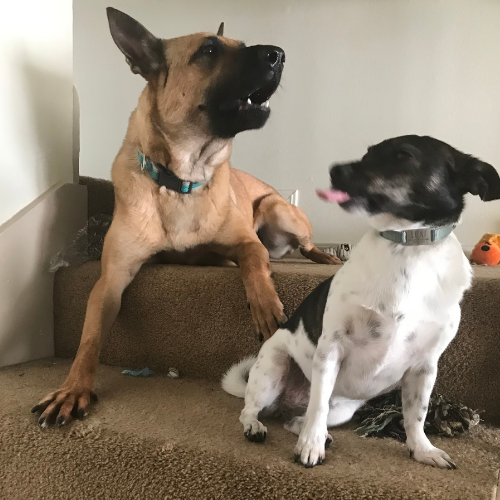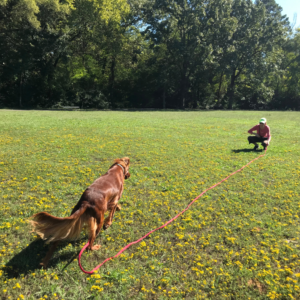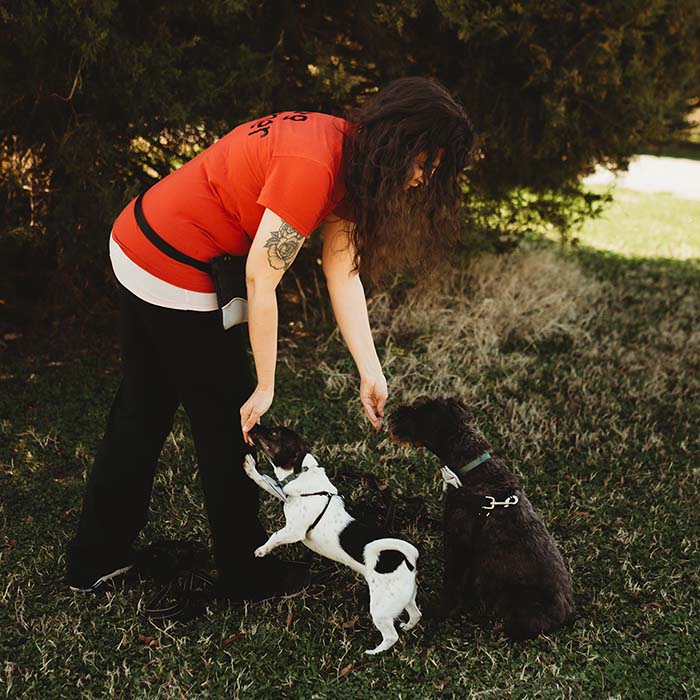I’ve (Elizabeth over here at Telltail Dog Training) been guilty in the past of throwing around suggestions of spay / neuter as a solution to behavior issues. With Lily and Lola (hear their story here), it does seem that if Lily had been able to get an earlier spay, their relationship might not have fractured the way it did when Lily went into heat. On the other side of everything, Lily’s spay didn’t automatically fix the situation. That will take some more time and behavior modification.
Anecdotally, I’ve seen neutered dogs target and attack unneutered dogs. But that’s not an issue for the unneutered, non-aggressive dog, and a neuter won’t change anything for that dog. And I’ll never forget when my own dog, Lexi, went into heat and a neutered dog ended up trying to mount me after I separated her from him. At 93 pounds, he was intent getting after this tiny, nine-pound dog. I don’t know if he was taking his frustration out on me, or/and if he had been neutered later in life and the remains of that biological impulse was kicking in. Who knows.
There’s just too much space for speculation, and there’s a lot we don’t understand about spaying and neutering and how that impacts behavior, if at all. There are some trainers who say that neutering a dog makes them less protective. Well, then we need to examine what protective means, because a lot of dogs seem to act in protective ways when it’s just anxiety or they’re not able to make calm decisions when in overarousal.
Of course, there are some health benefits to at least waiting to spay and neuter, as you can see here in Preventive Vet’s article on spay and neuter timing. Dr. Beth Turner does a pretty thorough job on breaking down additional considerations.
I spoke with Cathy Madson, MA, CBCC-KA, CPDT-KA, and Certified Dog Trainer and Behavior Consultant with Preventive Vet, about spay and neuter, and she shared, “Intrahousehold aggression cases are the most complex and difficult cases and are usually based around resources – making the support of a certified behavior consultant crucial.”
She added, “Spay/neuter timing is undergoing more study, and the data coming out is pretty surprising as they are noting some increased aggression types and fearful behavior after spay or neuter. So, the old advice to fix a dog to ‘fix’ or prevent behavior issues is proving incorrect or at the very least unhelpful for the problem. But again, more study is needed with larger sample groups. I rarely recommend spay/neuter for behavioral issues unless it is same-sex aggression to balance out the equation, and then only after consulting with the client’s veterinarian. And even then, progress depends on actual behavior modification and antecedent arrangement/management.”
So when would a dog trainer help and when do you need a behavior consultant or behaviorist or specialist or veterinary behaviorist?
Miranda Hitchcock, CBCC-KA, CPDT-KA, of Every Dog Austin explained that the difference in behavior modification and training can boil down to function compared to emotional reaction. While they can work together, and a lot of behaviorists are also trainers, not all trainers are behaviorists and may not be qualified to handle behavior challenges, like reactivity, aggression, or anxiety.
Note: Miranda was on the podcast previously to discuss accessibility and behavior. I did not ask her to speak specifically to spay and neuter. This content was also published in the January 2022 issue of Telltail Dog Magazine.
Training can be useful for practical cues, mental stimulation, and communication. “I tend to think about training as either, I want my dog to learn new cool stuff, which is fun, or I’m having some issues like counter surfing, we’re struggling a little bit with potty training, we’re struggling with the dog jumping up,” Miranda explained. “Any of these other things where there doesn’t appear to be sort of an emotional issue behind it.”
Behavior modification tends to have an emotional drive behind it. “I’m always a little bit hesitant from the applied behavior analysis perspective to assign emotions to things, but when we’re seeing things like aggression, we’re seeing lots of fearfulness, lots of anxiety or stress,” Miranda shared. “Any of these behaviors that, especially if they have a safety component, anything like that or anything that is dealing with a lot of anxiety and stress, those are the things where I want people to look for someone who has experience working with those kinds of cases. I think part of it is there’s a lot of confusion over the naming conventions, again because anybody can call themselves anything. I see a lot of people call themselves behaviorists, and for me, the only people who get to be behaviorists in the United States are veterinary behaviorits and people with PhDs who have the CAAB certification.”
CAAB Certification: There are two levels of certification: Associate Certified Applied Animal Behaviorist (ACAAB) and Certified Applied Animal Behaviorist (CAAB)
Some trainers have the experience needed for certain behavior issues, but not all do. Some may specialize. “There are plenty of great people out there who are trainers who are also great at dealing with behavior, but not all of them are,” Miranda said.
It can be challenging for dog owners to know when to seek out a trainer, a behavior expert, or a specialist. “I think that there are certain circumstances where looking for a CBCC or a certified behavior consultant is a really good idea because they are expected to have a minimum of understanding,” Miranda said. “There are also great trainers out there who are going to have the same minimum of understanding but it requires kind of digging into what they know and what kinds of cases that they deal with. There are lots of trainers who are like, ‘I’ll take basic reactivity, but as soon as there’s a bite or an incident or something else like that, I will not deal with it.’ So there’s a wide range. It’s hard for consumers to know with those things. It’s also totally okay to look for referrals. So if you have a vet behaviorist in your area that you’re interested in working with, seeing if they have trainers or behavior consultants that they work with can often be really helpful.”
CBCC-KA. Certified Behavior Consultant Canine-Knowledge Assessed (CBCC-KA®) is our advanced certification for dog trainers who offer canine behavior modification.
Miranda recommends examining the situation and reaching out for help if needed. “I think that’s one of the things for people to understand when they have a training issue versus a behavior issue,” Miranda said, “Are things like, is there aggression? Is there fear? Is there reactivity? Is this more than just my dog is bored, my dog is frustrated, my dog is doing naughty things that I don’t like versus my dog is doing things that feel like it’s a potential risk or feel like they’re struggling? I think people generally are pretty good at that. People can say, ‘Oh my dog’s tail is tucked and she shivers every time we go outside.’ Yeah, you don’t need just training, you need behavior modification. You need behavior support. A big piece of it is recognizing, is this something where there’s potentially an emotional component or potentially a safety component to this? And those are the times where I’m like, you’re looking for behavior support not just training support and you have to be aware that there may not be a fix or a quick fix to your behavior issue.”




